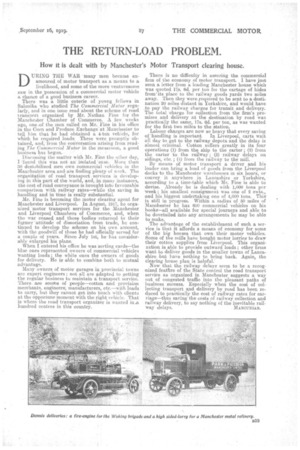THE RETURN-LOAD PROBLEM.
Page 17

If you've noticed an error in this article please click here to report it so we can fix it.
How it is dealt with by Manchester's Motor Transport clearing house.
DURING THE WAR 'many men became enamoured of motor transport as a means to a livelihood, and some of the more venturesome saw in the .possession of a commercial motor vehicle a chance of a good business career. • Thera was a little .coterie of young fellows in Salonika who studied The Commercial Mo(or regularly, and in one issue read about the scheme of road transport organized by Mr. Nathan Fine for the Manchester Chamber of Commerce. A few weeks ago, one .of the men called on Mr., Fine in his office in the Corn and Produce Exehange 'at Manchester to toll him that he had obtained a 44on vehicle, for which he required loads. These were promptly obtained, and, from the conversation arising from reading The Commercial Not-or in the messroom, a good busine•ss has begun.
Discussing the matter with Mr. Fine the other day, I !found this Was riot • an isolated case. More than :30 dertiobilized men own Commercial vehicles in the Manchester area and-are finding plenty of Work. The orgailiation. of road transport services is developing ihthis part of this :world, and,.. in Many instances, the 'Cost of road cOriVeyance is brought into favourable comparison with railway rates—while the saying in handling and in tinie is really substantial.
Mr. Fine is becoming the motor clearing agent for Manchester and Liverpool. In August, 19.3.7, he organized 'motor transport services for the Manchester. and Liverpool Chambers of Commerce, and, when the war ceased and those bodies returned to their former 'attitude of dissociation from trade, he continued to develop the scheme .on his own account, With the. goodwill of those he ha-{1% officially served for a couple of years. Since July 1st, he has consider
ably enlarged his plans. , When I entered his office he was sorting cards—the blue ones represented owners of commercial vehicles wanting loads; the white ones the owners of goods for delivery. He is able to combine both to mutual advantage.
Many owners of 'motor garages in provincial towns are expert engineers ; not all are adapted to getting the regular business to maintain atransport service. There. are. scores of .people—cotton and provision merchants, engineers, manufacturers, etc.—with loads to carry, but they cannot get into touch with clients at the opportune moment with the right vehicle. That is where the road transport organizer is wanted in..a hundred centres in this country. There is no difficulty in assuring the commercial firm of the economy of motor transport. I have just seen a letter from a leading Manchester house which was quoted 17s. 6d. per ton for the cartage of hides from its place to the railway goods yards two miles away. Then they were jrequired to be sent to a destination 20 miles distant in Yorkshire, and would have to pay the railway charges for transit and delivery. The total .charge for collection from the firm's premises and delivery at the destination by road was practically the same, 17s. 6d. per ton, as was wanted for the first two miles to the station.
Labour charges are now so heavy that every saving of 'handling is important, In Liverpool, carts wait all day to get to the railway depots and the delay is almost criminal. Cotton suffers greatly in its four operations (1) from the ship to the carter ; (2) from the carter to the railway; (3) railway delays on sidings, etc. ; (1) from the railway to the mill. By means of motor transport a driver and his loader can bring a load of goods from the Liverpool docks to the Manchester warehouses in six hours, or convey it anywhere in Lancashire or Yorkshire, according to a time-table which Mr. Fine is able to devise. Already he is dealing with 1,000 tons per week ; his smallest consignment was one of 2 ewts., and his biggest undertaking one of 4,000 tons. This is still in progress. Within a radius of 50 miles of Manchester he has 600 commercial vehicles on his books—all available for special journeys and able to ba dovetailed into any arrangements he may be able to make.
The advantage of the establishment of such a service is that it affords a means of economy for some of the big houses that own their motor vehicles. Some of the mills have bought motor lorries to draw their cotton supplies from Liverpool. This organization is able to provide outward loads ; other firms want to deliver goods in the smaller, towns of Lamashire but have nothing to bring back. Again, the clearing house plan is helpful: Now that the railway delays seem to be a recognized feathre of the State Control the road transport service as organized in Manchester suggests a way out of congested traffic into the pleasant paths of business success. Especially when the cost of collecting transport and delivery by road has been reduced to practically the cost of railway rates for carriage—thus saving the costs of railway collection and railway delivery, to say nothing of the inevitable rail way delays. MANcimmt.N.
























